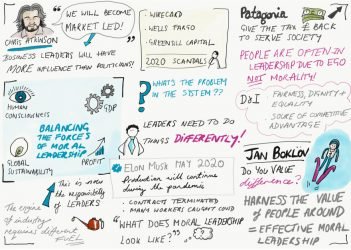Why the Corona Crisis will Disrupt our Industry

Why the Corona Crisis will Disrupt our Industry
Let’s make no mistake about it, this crisis will sweep away many businesses across many industries. We are already seeing the first companies go out of business, such as UK airline, Flybe. Financially weak companies or those unable to respond creatively to the changing environment are facing very difficult times. Examples of creative entrepreneurship include breweries starting their own delivery services, taxi drivers offering home delivery services such as grocery shopping and DJs/musicians live streaming from their living rooms instead of clubs.
There are, of course, some industries which simply cannot respond in this creative way to this crisis. Examples include automotive manufacturing companies, airlines and services such as hairdressers. These types of organisation must reduce or even stop production, ground their fleets, or close shops. The impact for some will no doubt be severe and long lasting. For other industries this crisis will serve as a catalyst: new ways of working will emerge where traditional thinking has previously prevented innovation. In this context players who move fast now, seeing opportunity and taking chances, will come out of this crisis stronger.
Take our own industry for example: strategy consulting, leadership training and executive development. Many trainers, coaches and consultants are facing a serious financial impact now that all face to face activities are postponed or cancelled. This is as true for independent freelancers and larger companies alike. As with all crises in the past, this one will be over at some point, but it is a very dangerous strategy to simply duck for cover and hope for the best. Sure, the storm will pass, but when we decide to stick our heads out when the coast is clear, the landscape will have changed drastically.
Many players in our industry have been clinging onto face to face delivery, believing it to be the only true and valuable way of delivering training and workshops. This has partly to do with the “we have always done it this way” philosophy, partly because the industry has been in high demand over the past few years, thus leaving little time and space for rethinking old business models and partly a fear of the unknown (or a combination of these). In any case, this crisis will now heavily accelerate the trend towards virtual learning, and it has the potential to disrupt our industry, in a positive way.
Together with some clients, Strategic Leadership started to go digital several years ago. We have learned a lot in that time about designing and delivering in the digital space. We have the experience of helping our clients transition towards blended learning – combining face to face AND digital learning. In this crisis, we are responding rapidly to the changing environment and are now increasing our virtual offering even further. This includes both broadening the existing digital offering and re-designing face to face formats to make them fit for virtual delivery (both live and on demand). Self-steered learning platforms, virtual training tools and online training communities are drastically changing the landscape right now.
For many companies in our industry, going digital suddenly is a must in order to survive financially, prevent revenue from being postponed too long, or cancelled completely. For our clients, this situation offers a huge learning opportunity and a big change. We know that well designed virtual learning delivers high value, desired results. Additionally, the benefits of virtual versus face to face events are numerous. They range from reducing travel time and cost, to lowering the carbon footprint and reducing the stress of business travel.
Once the crisis is over, clients will have learned what’s possible and will keep demanding these virtual services as part of development solutions. For the wider community of trainers, coaches and facilitators the impact of the crisis will be long lasting. It requires learning new skills, e.g. designing learning for the virtual space and delivering engaging content in a new way. It requires re-evaluating the self-image of those who see themselves as ‘front-of-the-room leaders’ or ‘entert(r)ainers’.
Those who don’t embrace this opportunity to pursue creative new ways of working will suffer twice: immediately from reduced business and lost revenue then secondly later, from not having adjusted to the changing environment and adjusted to client new demands. This is as true for our industry as it is for countless others. Now is the time to creatively re-think your business models. Now is the time to learn the skills you need to succeed in the virtual space. Now is the time to build alliances with others and invest into your future.
Stay healthy.



